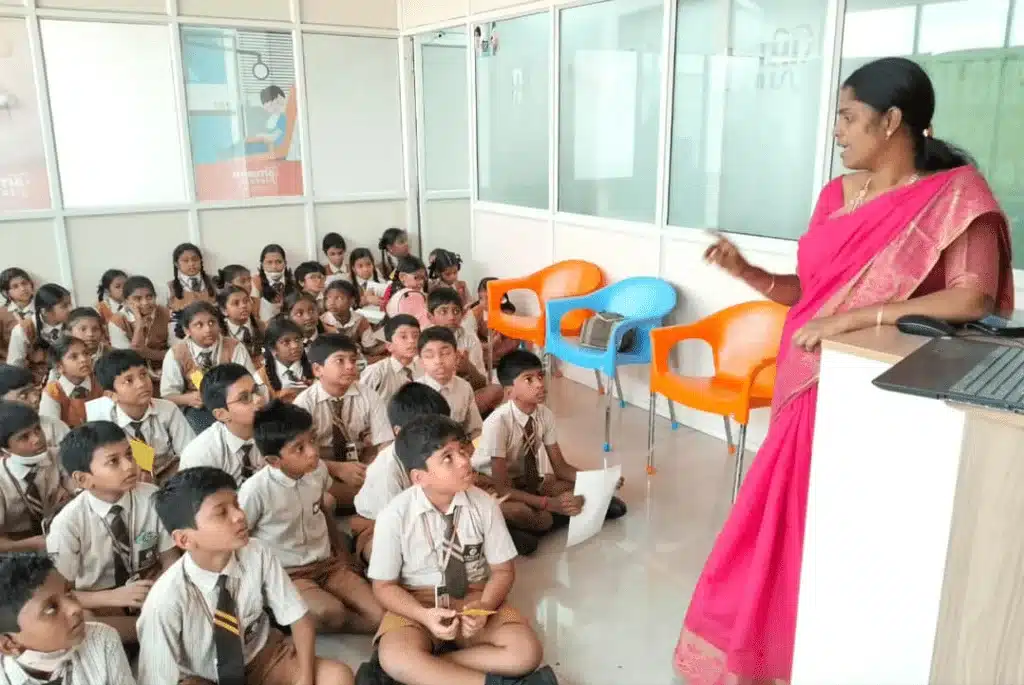Active listening skills are an invaluable asset in today’s fast-paced professional world. These skills enhance interpersonal relationships and play a pivotal role in students’ career growth. As students prepare to transition into the workforce, their ability to listen actively becomes a critical tool for success. This article delves into the importance of active listening skills, explores effective student engagement strategies, and presents various activities and techniques to improve students’ listening skills.
What is the Importance of Active Listening Skills?
Active listening goes beyond simply hearing words, it’s about grasping feelings, and situations behind what’s being said. This is super important for good communication and teamwork. When you’re really good at active listening, you can connect with others, solve issues, and make smart choices at work. For students, learning this skill early on can help a lot, especially in jobs that involve working together, helping customers, talking things out, or leading a group.
Active listening goes beyond simply waiting for your turn to speak. It involves giving your full attention to the speaker verbally and non-verbally to show that you value their thoughts and perspectives.
Here are 7 key points that highlight the importance of active listening skills for students:
- Enhanced Understanding: Active listening allows you to understand better what others are trying to convey. By focusing on the message and the speaker’s tone, body language, and emotions, you can comprehend the complete message and avoid misunderstandings. It allows you to understand things deeply rather than at a surface level.
- Building Trust and Relationships: When people feel heard and understood, they are more likely to form a trustworthy relationship with you. Active listening helps create a positive and empathetic environment that fosters strong relationships in personal or professional settings. This trust is essential for effective collaboration and cooperation.
- Conflict Resolution: Active listening plays a crucial role in resolving conflicts. By having the patience to truly listen and understand the concerns and viewpoints of all parties involved, you can address the underlying issues and work toward mutually acceptable solutions. This prevents conflicts from escalating and promotes harmony.
- Effective Problem Solving: When actively listening, you gather all the relevant information and perspectives needed to address a problem comprehensively. This enables you to develop well-informed and effective solutions that consider different viewpoints and potential outcomes.
- Improved Communication: Active listening helps you become a better communicator. When others see that you genuinely listen to them, they are more likely to reciprocate by listening to your ideas and opinions. This reciprocal communication fosters a more productive and collaborative environment.
- Empathy and Emotional Intelligence: Active listening is a key component of emotional intelligence. You can respond with empathy and sensitivity by understanding the emotions behind the words. While practicing active listening, you learn to be patient as well as disciplined while listening to the other person. This is particularly important when supporting others during difficult times or when dealing with sensitive topics or conflicts.
- Personal and Professional Growth: Developing active listening skills can contribute significantly to your personal and professional growth. Personal relationships can lead to deeper connections and more meaningful interactions. In the workplace, it can open doors to leadership positions, as effective leaders are known for their ability to understand and guide their teams.
Student Engagement Strategies
Educators can implement innovative engagement strategies to foster active listening skills among students. Group discussions, debates, case studies, and role-playing exercises encourage students to listen, process information, and respond thoughtfully and actively. These strategies enhance comprehension and simulate real-world scenarios where active listening is paramount.
Here are some more student engagement strategies that educators can implement to foster active listening skills:
- Think-Pair-Share: In this technique, students, including pre-primary, primary, and high school students, are given a thought-provoking question or topic related to the lesson. They first think individually about their response, then pair up with a classmate to discuss their thoughts, and finally share their ideas with the whole class. This encourages active listening during both the paired discussions and the sharing phase.
- Jigsaw Method: Divide the class into small groups, and assign each group a different segment of the lesson or topic. Each student becomes an “expert” on their assigned segment. Afterward, the groups reorganize so that each new group has one “expert” from each original group. Students then teach their segment to their new group members, promoting attentive listening and collaborative learning.
- Interactive Quizzes: Break up the lesson with interactive quizzes or polls related to the presented content. This keeps students engaged, attentive and encourages them to listen carefully to the material, and allows for immediate feedback on their understanding.
- Visual Aids and Demonstrations: Incorporate visual aids, videos, or demonstrations that complement the lesson content. These visual elements capture students’ attention and help reinforce the concepts discussed, leading to more attentive listening.
- Guest Speakers and Experts: Invite guest speakers or subject matter experts to share their insights with the class. This offers a fresh perspective and encourages students to listen closely to real-world experiences and expertise.
- Digital Platforms and Discussion Boards: Use online platforms to facilitate discussions outside of the classroom. This asynchronous format gives students more time to formulate thoughtful responses, requiring them to engage attentively with their peers’ contributions.
- Storytelling: Incorporate storytelling or real-life anecdotes related to the subject matter. These narratives capture students’ interest and encourage them to listen carefully to shared details.
By incorporating these innovative engagement strategies into their teaching practices, educators can create a dynamic learning environment that nurtures active listening skills and enhances students’ comprehension and participation.
3 Activities to Improve Listening Skills in Students
- Reflective Journals: Encourage students to maintain reflective journals after lectures or presentations. This activity prompts them to summarize key points, identify misunderstandings, keep a track of their progress and ask clarifying questions.
- Peer Interviews: Organize peer interviews where students pair and interview each other on specific topics. This activity develops listening skills and requires students to synthesize information accurately.
- Critical Response Exercises: Provide students with thought-provoking audio clips or podcasts. Ask them to write critical responses, demonstrating their ability to grasp nuances and evaluate information.
Listening Activities for Students
- Verbal Summaries: After a class discussion, have students take turns verbally summarizing the main points. This encourages them to focus on the speaker’s message, recollect and comprehend their knowledge in a uniform manner, and condense it into key takeaways.
- Picture Descriptions: Show students a complex image or diagram related to the subject matter. Ask them to describe it to a partner without showing them the visual aid. This activity sharpens their descriptive listening skills.
- Storytelling Challenges: Students form groups and each member takes turns contributing a sentence to a story. This requires attentive listening to maintain the narrative flow.
3 Effective Techniques to Improve Listening Skills
- Mindfulness Meditation: Introduce mindfulness techniques to help students develop concentration and focus, essential components of active listening.
- Active Note-Taking: Teach students to take organized, relevant notes during lectures. This practice encourages them to filter information, identifying key points and supporting details.
- Empathetic Listening: Stress the importance of empathetic listening – understanding not just the words but also the emotions and perspectives of the speaker.
How does Dr. Kishore’s Ratnam Schools help students develop active listening skills?
Dr. Kishore’s Ratnam Schools, considered one of the best school in Tirupati and Nellore help students develop active listening skills that contribute to students’ career growth. Here are some of how the school helps students to develop these skills:
- Active listening is embedded in the school’s curriculum: Students are taught the importance of active listening, from English to math to science, in their classes. They learn to pay attention to the speaker, ask clarifying questions, and summarize the speaker’s main points.
- The school provides opportunities for students to practice active listening: Students are given opportunities to participate in group discussions, debates, and presentations. These activities help them to develop their listening skills and to learn how to communicate with others effectively.
- The school’s teachers model active listening skills: The teachers at Dr. Kishore’s Ratnam Schools are excellent listeners. They pay attention to student’s questions and concerns and take the time to understand what they say. This modeling not only helps the students feel heard and validated, but also to see the importance of active listening and to learn how to do it themselves.
As a result of these efforts, Dr. Kishore’s Ratnam Schools students develop strong, active listening skills. These skills help them to succeed in school and their careers. Active listeners are better communicators, more likely to be promoted, have better interpersonal development and are more likely to be successful in their relationships.
Final Words:
Active listening skills are crucial in professional success. Students who cultivate these skills are better poised to excel in their careers, from building effective collaborations to making informed decisions.Teachers can help students get better at listening by using strategies and activities that get them involved. This will help in their overall development and persona, and also with their professional endeavors. As students sharpen their ability to listen actively, they unlock opportunities and become catalysts for positive change in the workforce.



